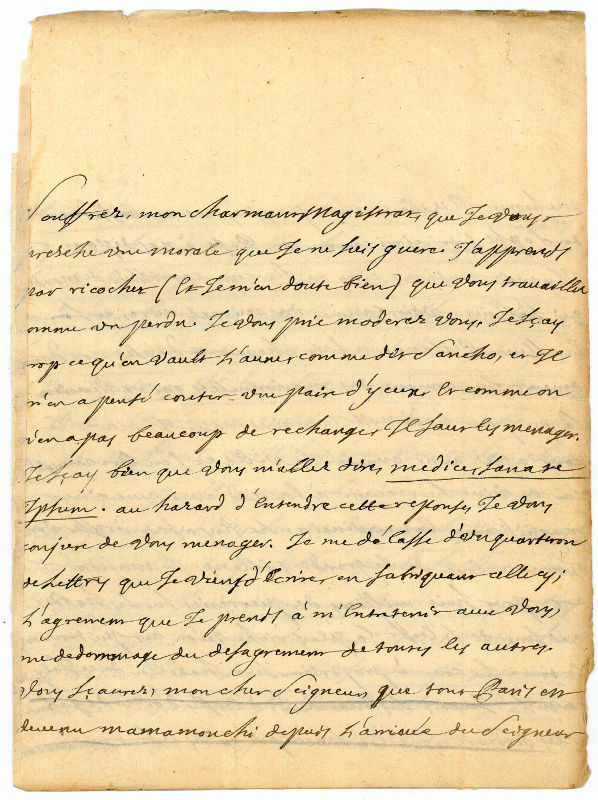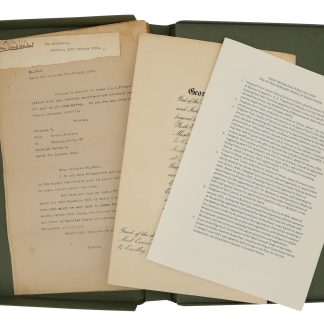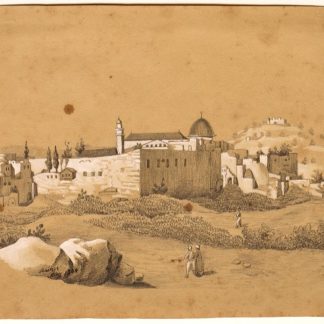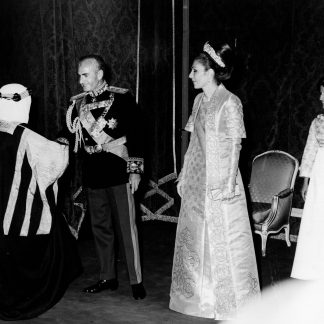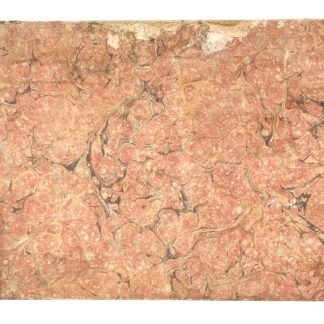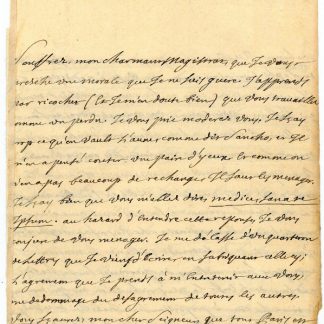Mehmet Reza Bey visits France, and "tout Paris" goes "mamamouchi"
Autograph letter signed ("Lauthier").
4to. 3½ pp. on bifolium with integral address panel.
€ 3.500,00
A first-hand account of the sensational entry of Mohamed Reza Bey, the Persian ambassador who visited Paris for six months beginning 7 February 1715. Adressed to Monsieur de Gallice, councillor of the Parliament of Aix-en-Provence, for delivery to the Parliament's Advocate General, Gaspard de Gueidan (1688-1767), the letter describes the ambassador's arrival, his reception (which is likened to that of a Pope), and the craze he creates among the onlookers, who sing, dance, and stare at him as at a strange animal: "Souffrez, mon charmans magistrats, que je vous presente une morale que je ne sais guere [...] Vous sçavrez, mon cher seigneur, que tout Paris est devenu mamamouchi depuis l'arrivée du seigneur Mehemet Rizabeek en ce pays cy. Cet ambassadeur de Sophi s'est réjouï comme un Pape à nos dépens. Il y avait toujours cinq ou six cent carrosses du monde qui l'allaient voir, comme un animal rare; et Son Excellence Persanne a fait chanter et danser nos dames devant luy, comme des marionnettes qui ne venoient là que pour le divertir. Maintenant il occupe la cour aprez avoir amusé la ville et s'en être amusé. Car on veut le recevoir à son audience avec une magnificence extraordinaire. Le Roy a fait dresser un trone au bout de la grande gallerie. Sa Majesté aura pour huit millions de pierreries sur ses habits [...]; et toute la cour à proportion sera habillée de ce joly coup là. Jamais les marchands d'étoffes d'or et de galons ni les brodeurs n'ont été si occupés [...] Il est vray que le tout se fait à crédit. Mais les gens de qualité sçavent trop bien leurs privileges, pour s'aviser de déroger en payant leurs dettes; cela est du dernier bourgeois. Aussy je vous assure que jamais la cour n'a été autant de qualité [...] Il faut espérer qu'aprèz ce bel oiseau de Perse, il viendra quelque autre amusette au peuple de Paris [...] Je vous avoueray bonnement que j'ay eu la curiosité de voir son entrée dans Paris, afin de l'étudier. Heureusement, il fit une pluye continuelle ce jour là! De sorte que Son Excellence se mit presque en negligé et que Sa Magnificence fut des plus minces, et je trouvay que cela ne valoit pas la façon de ma curiosité. Je ne fut pas le seul pris pour dupes tout Paris y fut trompé [...]".
The ambassador Mohamed Reza Bey (Mehmet Riza Beg) had been chosen for the mission by the Shah of Persia, Sultan Husayn, and travelled with a grand entourage, as befitted the diplomat of a mighty empire. He was solemnly received in the Hall of Mirrors at Versailles on 19 February 1715 with one of the most lavish ceremonies of the final months of the reign of Louis XIV. During his stay he conducted negotiations towards establishing trade treaties between Persia and France, and conferred with the French on possible joint military operations against the Ottoman Empire. The ambassador's exotic personage inspired the French imagination to create a whole artistic and literary current, the most lasting product of which are Montesquieu's "Lettres Persanes" (1725).
The lawyer Pierre Lauthier, a celebrated orator in his day, was the son of the Aix-based medical writer Honoré Maria Lauthier. Although most bibliographies credit the latter with the biographical preface to Joseph de Tournefort's posthumously published "Voyage into the Levant" (simply signed "Lauthier"), it is not unlikely that Pierre, with his penchant for the exotic, is the actual author of the Life of that famous Aix-born botanist and Middle East traveller (cf. Wellcome III, 458).
Removed from a registry, with traces of mounting along the left edge of p. 1. Traces of oribial folds; slight edge defects, some from removal of the seal, but well preserved on the whole.

